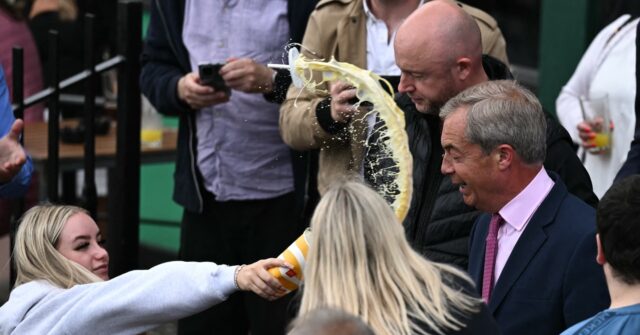On June 4th, during a campaigning event in Clacton-on-Sea, Reform UK leader Nigel Farage was assaulted by a leftist OnlyFans model named Victoria Thomas Bowen. The 25-year-old threw a McDonald’s milkshake at Farage while he was addressing his supporters, which led to her arrest and subsequent court proceedings. Bowen appeared before the Westminster Magistrates’ Court where she pled guilty to assault by beating and admitted to damaging a suit owned by Farage’s bodyguard, resulting in a total cost of £17.50. This action sparked significant media coverage and public discourse surrounding the implications of such assaults on democracy.
Following her guilty plea, Farage publicly addressed the incident, expressing that such actions undermine democratic processes. He questioned the lack of engagement from political leaders like Keir Starmer and Rishi Sunak during the election campaign, suggesting that this incident is emblematic of broader issues within political culture. Farage emphasized that Bowen’s behavior was indicative of a lack of respect for political institutions, suggesting that her actions trivialized serious political discourse. Additionally, he pointed out the financial implications of the legal proceedings, indicating that Bowen’s refusal to plead guilty until the last moment had wasted public resources.
Interesting to note is Bowen’s background as a model on OnlyFans, through which she reportedly profits from publicity, including from incidents like the attack on Farage. After the milkshake incident, she shamelessly capitalized on her notoriety, posting a suggestive image on Instagram and referencing the attack with lyrics from the rapper Kelis. This act of self-promotion raised concerns about the blurring of lines between serious political discourse and sensationalism, as the attention garnered from the incident seemed to bolster her online presence and following, particularly among leftist circles.
Social media reactions to the incident revealed a division in public opinion. Some leftist figures, including Guardian columnist Owen Jones, celebrated her actions, with Jones deeming a photograph from the incident as “art.” The campaign group Stand Up to Racism also expressed elation at Bowen’s actions, reflecting a segment of society that views such confrontational acts against political figures as acceptable forms of protest. This reaction illustrates the polarized landscape of contemporary British politics, where acts of aggression towards political representatives are viewed through various ideological lenses.
In August, another individual who had attacked Farage was not sentenced to jail time, leading to accusations of a two-tiered justice system in the UK. This perception of unequal enforcement of justice resonated with observers who believe that people on opposing ideological sides might face different consequences for similar actions. Bowen’s case will be further addressed during her sentencing hearing scheduled for December, leaving the political arena abuzz with debates about the adequacy of legal responses to politically motivated violence.
Overall, this incident involving Victoria Thomas Bowen and Nigel Farage has become a focal point for discussions on political decorum, the role of social media in modern activism, and the legal repercussions for politically charged behaviors. As far-right and leftist factions continue to clash both online and offline, the implications of Bowen’s actions extend beyond her individual case, raising questions about the nature of political engagement and the responsibilities of citizens in a democratic society. The upcoming sentencing will likely generate further dialogue concerning accountability and the interactions between politics and public sentiment in contemporary Britain.

